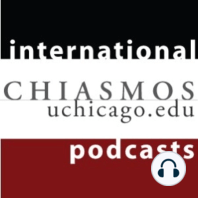35 min listen

"Terror in Mumbai: Reflections on the Aftermath"
"Terror in Mumbai: Reflections on the Aftermath"
ratings:
Length:
98 minutes
Released:
Jan 14, 2009
Format:
Podcast episode
Description
A panel discussion with Steven Wilkinson, Martha Nussbaum, Tarini Bedi, Robert Pape, and Manan Ahmed.
On November 26, 2008, the world watched while terror attacks paralyzed Mumbai, India's financial capital and largest city. Mumbai bounced back, but the bold, new strategies of the attacks shifted the discourse of the global war on terror. The panelists discuss the consequences of terror in Mumbai for the region and the world. Introductory remarks by Steven Wilkinson.
Steven Wilkinson is an Associate Professor of Political Science and an expert in colonization, ethnic conflict and nationalism in India.
Martha Nussbaum is Ernst Freund Distinguished Service Professor of Law and Ethics and an expert on rights, justice and democracy.
Tarini Bedi is a cultural anthropologist who conducted her research with the Shiv Sena party in Mumbai and is the Associate Director of the South Asia Language and Area Center and the Committee on Southern Asian Studies.
Robert Pape is a Professor of Political Science specializing in international security affairs and the author of Dying to Win: The Strategic Logic of Suicide Terrorism.
Manan Ahmed, recently minted PhD in the history of Islam in South Asia, blogs on international affairs at Chapati Mystery with a focus on media and Pakistan.
This event was presented by the South Asia Language and Area Center, the Committee on Southern Asian Studies, and the Center for International Studies, and co-sponsored by the International House Global Voices Lecture Program.
On November 26, 2008, the world watched while terror attacks paralyzed Mumbai, India's financial capital and largest city. Mumbai bounced back, but the bold, new strategies of the attacks shifted the discourse of the global war on terror. The panelists discuss the consequences of terror in Mumbai for the region and the world. Introductory remarks by Steven Wilkinson.
Steven Wilkinson is an Associate Professor of Political Science and an expert in colonization, ethnic conflict and nationalism in India.
Martha Nussbaum is Ernst Freund Distinguished Service Professor of Law and Ethics and an expert on rights, justice and democracy.
Tarini Bedi is a cultural anthropologist who conducted her research with the Shiv Sena party in Mumbai and is the Associate Director of the South Asia Language and Area Center and the Committee on Southern Asian Studies.
Robert Pape is a Professor of Political Science specializing in international security affairs and the author of Dying to Win: The Strategic Logic of Suicide Terrorism.
Manan Ahmed, recently minted PhD in the history of Islam in South Asia, blogs on international affairs at Chapati Mystery with a focus on media and Pakistan.
This event was presented by the South Asia Language and Area Center, the Committee on Southern Asian Studies, and the Center for International Studies, and co-sponsored by the International House Global Voices Lecture Program.
Released:
Jan 14, 2009
Format:
Podcast episode
Titles in the series (100)
John Mearsheimer: "The War in Iraq and America's Role in the World" by CHIASMOS: The University of Chicago International and Area Studies Multimedia Outreach Source [audio]